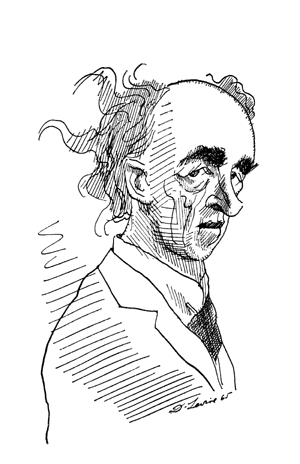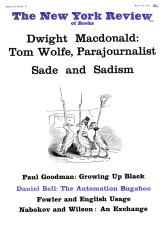“Joyce was strangely in love with his own birthday and with mine. He had discovered somehow that he and I were twins, born in the same hour of the same day of the same year in the same city. The bed it seemed was different, and that was the only snag in our relationship.” The city was Dublin, the year 1882, the day February 2nd, the hour six in the morning, the Joyce James, the speaker James Stephens. The truth of the matter is probably less poetic. Hilary Pyle tries to show that Stephens was born on February 9th, 1880, but I am happy to report that the evidence is inconclusive. In any event Joyce believed in the poetry; so much so that in 1927 when things were going badly with Finnegans Wake he thought of having Stephens finish the work. Stephens’s qualifications were indisputable. His name, like Joyce’s, was James, he was a poet, a Dubliner, fortunately born, nominally close to the Stephen of A Portrait of the Artist as a Young Man, and he had good eyesight. Finally, the lettering on the book would be JJ and S, as Joyce wrote to Harriet Weaver, “the colloquial Irish for John Jameson and Son’s Dublin whisky.” The auspices were unimpeachable. Two years later Joyce and Stephens were still discussing the notion. So it petered out.
The first meeting of these Dubliners was a sharp encounter.
He turned his chin and his specs at me, and away down at me, and confided the secret to me that he had read my two books; that, grammatically, I did not know the difference between a semi-colon and a colon: that my knowledge of Irish life was non-Catholic and, so, non-existent, and that I should give up writing and take to a good job like shoe-shining as a more promising profession.
The speaker is again Stephens in one of the B.B.C. talks with which he filled the vacancy of his last years. Lloyd Frankenberg has brought these and other memorabilia together and they are well worth having. As a critic Stephens was no T. S. Eliot but he was worth listening to while he recalled his friends, men like George Russell (AE), Yeats, Joyce, Synge, and Stephen MacKenna. The tone of these reminiscences is always genial: Stephens did not traffic in mockery. An occasional slyness keeps the judgment alert. “Still, I’m inclined to believe that Yeats and I were the only poets with good manners that ever lived. When he had finished a poem I always asked him to say it again and when I had finished one he as scrupulously invited me to repeat the last verse.” Of Stephens’s sing-song method of reading his poems Yeats said: “Stephens has a very original talent, he has discovered Gregorian Chant.”
Not that the poems are very good, however you sing them. Stephens wrote a few perfect short pieces, such as “The Goat Paths,” “Geoffrey Keating,” “Nora Criona,” “The Paps of Dana,” and “Egan O’Rahilly,” but in most of his poems there is less than meets the ear. His most celebrated poems, “The Main-Deep” and “The Shell,” are sound tracks, too pure to be true. Luckily, there is more to him than the verse.
Shall we say, to begin with, that Stephens was a second-rate writer who wrote one first-rate book, The Crock of Gold (1912), and showed in The Charwoman’s Daughter and “There is a Tavern in the Town” that at any moment he might do it again. He never did it again. Instead, he went serious, read books he should have left uncut, and took to big thought on the supposition that it would add cubits to his stature. He wrote better as a short man.
To put this in its context. Within ten years or so Irish literature produced Joyce’s Dubliners and the Portrait, Synge’s Playboy of the Western World, Yeats’s The Green Helmet, and Stephens’s Crock of Gold. None of these is shamed in the presence of the others. Synge and Stephens gave their best in one shot: Joyce and Yeats went on to even greater things. But let that be. The Crock of Gold is one of the finest romances in modern literature, a revery sharpened into words for the delight of the thing. Reading it again now one is touched by Stephens’s care, his delicacy, his concern to keep life out of harm’s way by protecting it with words. Many scenes in the book take the harm out of daily life by bandaging the sore places with words. The relation between the old Philosopher and the Thin Woman, for instance, is as terrible as any human relation could be, if we take it as a relation and fend off the words. Stephens does not dissolve the terrible thing out of existence, but he protects its victims so that the hurt cannot be fatal. The first protection is the genre itself, the second is the words. At one point the Thin Woman says: “Your stirabout is on the hob…You can get it for yourself. I would not move the breadth of my nail if you were dying of hunger. I hope there’s lumps in it.” There are, indeed, lumps in it, because stirabout needs to be stirred. The Thin Woman jumps into bed and tries to give the poor Philosopher rheumatism, tooth ache, and lockjaw all at once by malignant desire. But Stephens protects him by secreting him in his generic role: if he is a husband he is also and chiefly a philosopher. Hence: “Finality is death. Perfection is finality. Nothing is perfect. There are lumps in it,” said the Philosopher.
Advertisement
This is a basic pattern in Stephens’s writing. He uses words as a nurse uses ointment, to make the patient easier. If marriage is painful he talks the pain out of it. In “There is a Tavern in the Town” the old gentleman drops a button, picks it up, thinks of his housekeeper, then of the strangeness of housekeeping and matrimony. “Like so many other customs,” he says, “marriage is not native to the human race, nor is it altogether peculiar to it. So far as I am aware no person was ever born married, and in extreme youth bachelors and spinsters are so common as to call for no remark.” So he proceeds. In Stephens’s fiction as long as a man is talking he is doing nothing else; not even suffering. The consolations of speech, like those of breathing and philosophy, are intrinsic, native to the medium. In most writers language is a beast of burden, content in the knowledge that it is, within its limits, an efficient carrier of thought: most of the time it stands and waits. But in Stephens the language frets if thus restrained: it aspires to the condition of whim. This does not mean that it resents the prosaic attachments, grammar, syntax, and the like. Not at all. In fact, Stephens’s language delights in these adornments, now that it has commandeered them for its own purposes. Hence his talkers, like Samuel Beckett’s, are all grammarians, almost pedants in rectitude. Some of them are even aestheticians, despite their amateur status. A few years ago a brilliant woman, Elizabeth Sewell, wrote; “Words are the only defense of the mind against being possessed by thought”; or something to that effect. The aphorism was her own and yet I almost think she took it from a story by Stephens: certainly her beautiful book The Field of Nonsense is the best Introduction to The Crock of Gold, with this qualification, that the philosophers in Stephen’s romance consider words an entirely adequate defense of the mind against being possessed by thought or action. In Stephens’s books thought is beaten before it begins, if it dares to live its own life: words, for one thing, have all the advantages of vagary and quirk. Thought is a sober citizen, words are libidinous in their conjunctions. Hence the really destitute people in Stephens’s world are the silent ones, like secret drinkers, all thought and not a word. In “A Glass of Beer” the boulevardier sees himself “as a box with nothing inside it”: the gods and the devils have abandoned him to this silence.
I have touched on a commonplace, that modern Irish literature is a wordy business. We have had our solid novels, tracts for the times, beasts of burden, but they are not indigenous. The native product tends to be runic, archaic, pedantic, a caprice of words alone. I have in mind books like Flann O’Brien’s At Swim-Two-Birds, Eimar O’Duffy’s King Goshawk, Brinsley Macnamara’s Various Lives of Marcus Igoe, Austin Clarke’s The Sun Dances at Easter. Stephens is a crucial figure in this tradition. In such books the motto is: keep talking, and it can’t happen. Life is suffered only in the cracks between the words. Hence in The Crock of Gold the sergeant urges Shawn to cut in and keep on talking to prevent the Philosopher from keeping on talking. “Sure, I don’t know what to talk about,” says Shawn. “I’m sweating this minute trying to please you, so I am. If you’ll tell me what to talk about I’ll do my endeavors.” “You’re a fool,” says the sergeant: “you’ll never make a constable.” When Yeats said, “Words alone are certain good,” you knew he didn’t mean it. If Stephens had said it, he would have meant it, and while reading him we are convinced that it is true. In one of his radio talks Stephens wondered about those people who love music and hate poetry. That this can happen, he said, “flabbers one and ghasts one, than which two nothing worse can happen.” And he added, making it all clear: “To ghast I understand and wince from, but to flabber beats me.” That was Stephens, not Yeats.
Advertisement
To write the biography of such a man is therefore to fly in the face of nature, because the only significant events in his life were verbal. Hilary Pyle tells us what he did and when, but it is nothing: what he read and with what devotion, but it is little enough. She tells us about the influence of Blake, which I believe was nil. And so on. But she never explains what is going on in the only place where anything is going on, in Stephens’s pages. As a result, much of her book goes like this:
Kot and Stephens would also meet at Twinings in Piccadilly. They would go to dinner afterwards in Great Portland Street and end the evening in the Casa Prada, near Warren Street. Another favorite haunt was Ridgeway’s, where it soon became a habit to meet on Wednesdays, and a group formed including Ralph Hodgson, Leonard Woolf, J.W.N. Sullivan, Lady Glenavy, sometimes Mark Gertler or W. J. Turner, Lady Ottoline Morrell, Middleton Murry and Lady Huxley. Poetic discussion was lively, and Stephens would often scribble out one of his poems on a piece of paper and give it to Kot, who preserved several among his papers.
(Kot, by the way, is “Koteliansky, the big Russian Jew.”)
The ideal reader of Stephens, Miss Sewell excepted, is probably Marianne Moore. Next, the ideal reader of Stephens is anyone who loves to read Miss Moore; anyone who is, in Bacon’s phrase, a ready man. Even yet, Stephens is the only writer, Miss Moore excepted, who would think of rhyming “tale-spinner” with “Yul Brynner,” and he would be the first to congratulate Miss Moore upon the nonchalance of that invention.
He died, of this we are sorrowfully sure, on December 26, 1950.
This Issue
August 26, 1965




